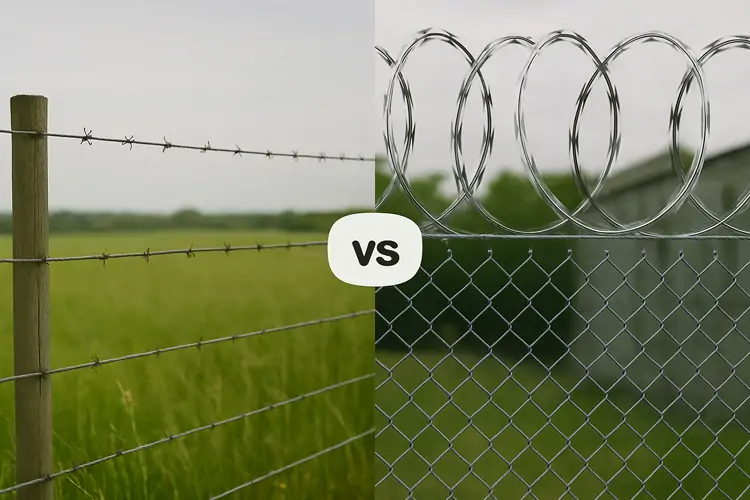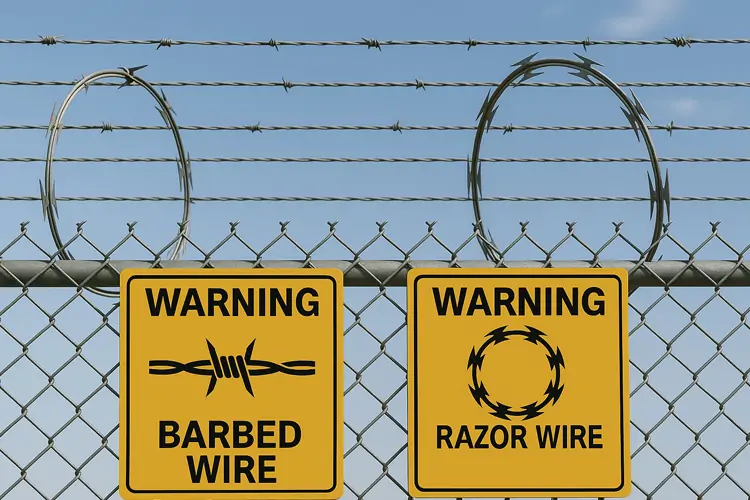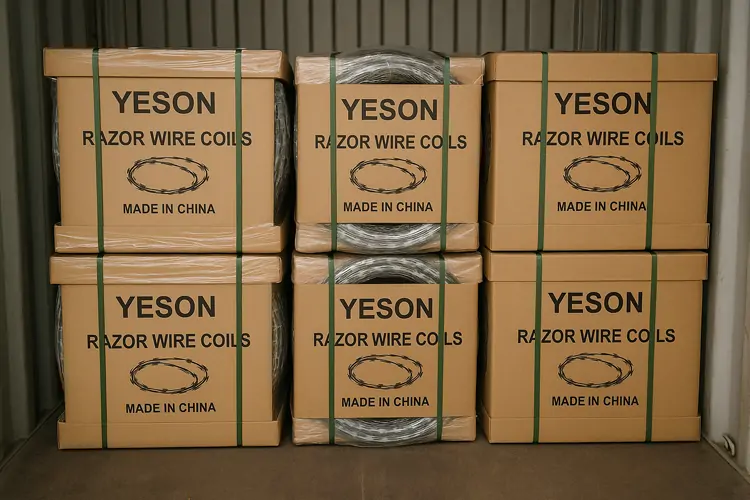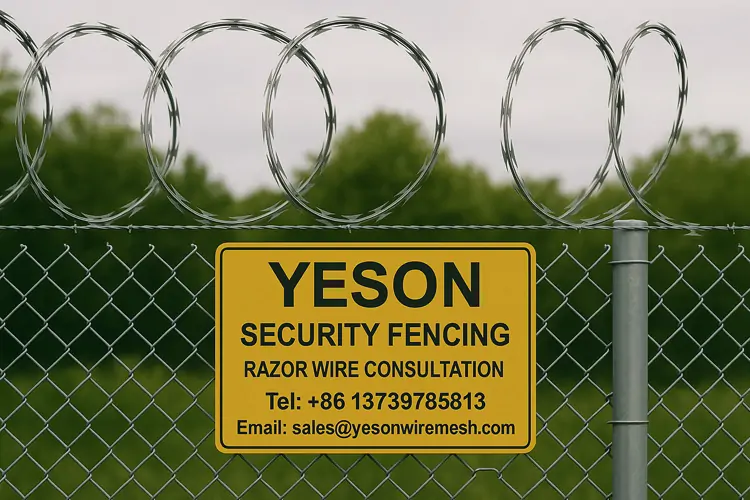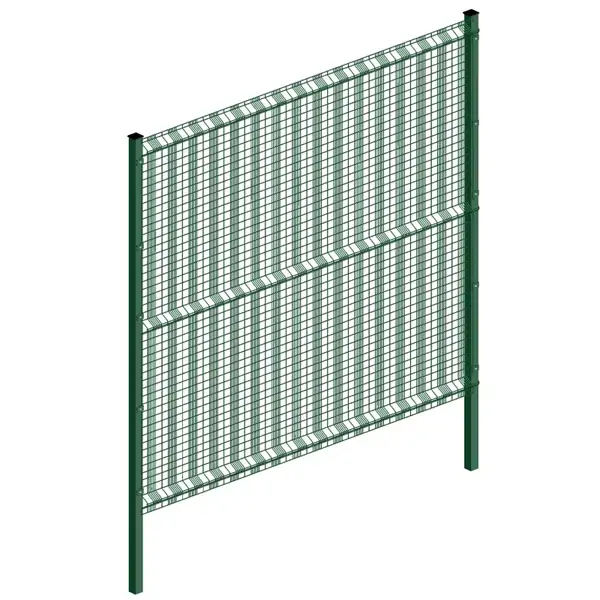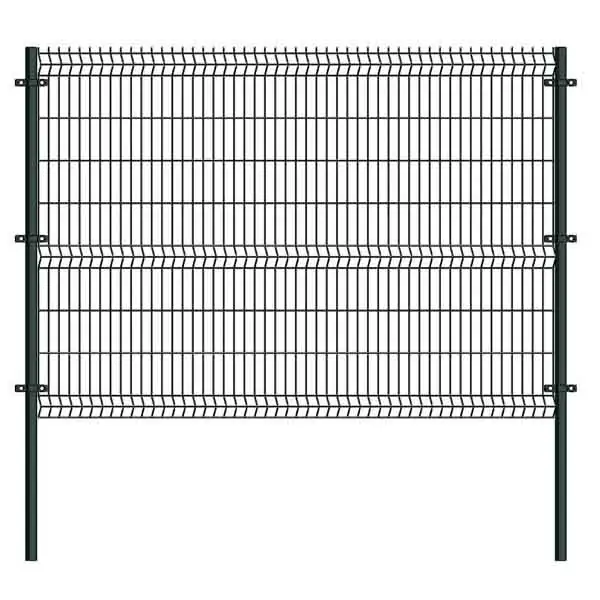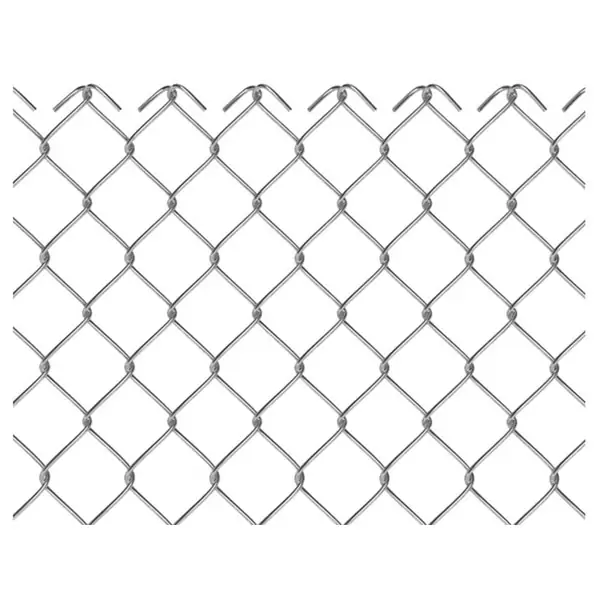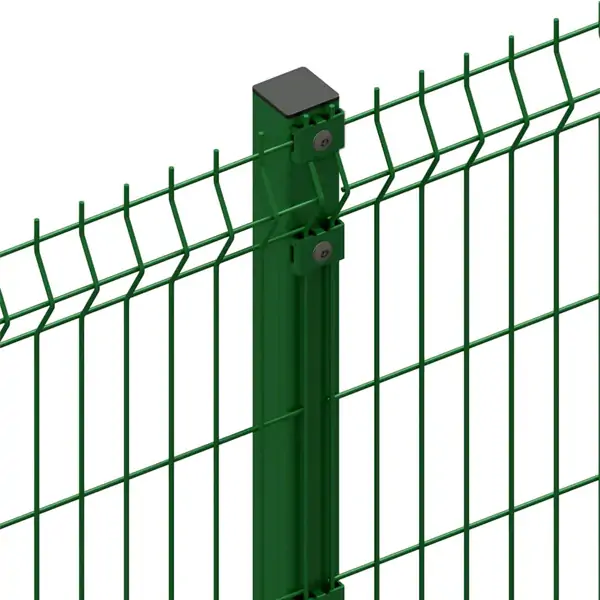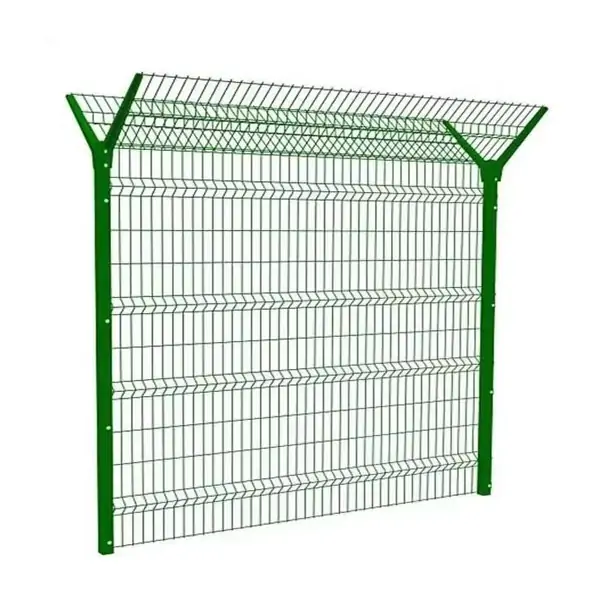Table of Contents
ToggleIntroduction
When it comes to perimeter security, two fencing options dominate the conversation: barbed wire and razor wire. At a glance, they may appear similar — both have sharp edges and are used to deter intruders. However, these two wires differ significantly in design, effectiveness, cost, legal considerations, and typical usage.
If you’re wondering which wire suits your property best — whether it’s for a rural farm or a high-security facility — this guide will give you the full picture.
What Is Barbed Wire?
Barbed wire has been around since the late 19th century and was originally designed to control livestock. Over time, it became widely used for basic security fencing due to its affordability and effectiveness in rural settings.
Structure & Material:
Barbed wire consists of two or more steel wires twisted together with sharp barbs placed at regular intervals. The barbs are usually spaced about 5 to 6 inches apart and can have 2 or 4 sharp points.
Key Features of Barbed Wire
-
Made from galvanized or stainless steel
-
Lightweight and flexible
-
Barbs typically have 2 or 4 sharp points
-
Easy to install over wooden or metal posts
Applications of Barbed Wire
-
Farms and ranches
-
Livestock enclosures
-
Rural property boundaries
-
Temporary fencing
Advantages of Barbed Wire
-
Cost-effective for large areas
-
Simple installation and maintenance
-
Adequate deterrence for animals and humans
-
Can be electrified for added security
What Is Razor Wire?
Razor wire, also known as concertina wire, is a more modern invention designed for high-security fencing. It is commonly seen in military installations, prisons, and other sensitive areas.
Structure & Material:
Razor wire is made by crimping razor-sharp metal blades around a high-tensile steel wire core. It is often formed in coils and installed on top of fences to make climbing virtually impossible.
Key Features of Razor Wire
-
Blades designed to cut deeply upon contact
-
Extremely high deterrence level
-
Comes in various forms: flat wrap, single coil, double coil (concertina)
-
More intimidating appearance than barbed wire
Applications of Razor Wire
-
Military facilities
-
Prisons and correctional institutions
-
Airports and border fences
-
Private properties needing maximum deterrence
Barbed Wire vs. Razor Wire – Key Differences
Let’s break down how these two fencing options compare side by side:
Structure & Material
-
Barbed wire: Twisted wire strands with blunt barbs
-
Razor wire: Single core wire with sharp-edged blades
Security Level
-
Barbed wire: Moderate — can deter but not stop determined intruders
-
Razor wire: High — painful and dangerous to climb over
Installation Complexity
-
Barbed wire: Easy DIY installation
-
Razor wire: Requires safety gear and professional handling
Cost
-
Barbed wire: Low upfront and maintenance cost
-
Razor wire: Higher material and installation costs
Visual Deterrence
-
Barbed wire: Subtle and traditional appearance
-
Razor wire: Aggressive and intimidating look
Lifespan & Maintenance
-
Both types are corrosion-resistant (galvanized), but razor wire tends to last longer in harsh environments.
Which One Should You Use? (Use Case Analysis)
Best Uses for Barbed Wire
-
Large agricultural properties
-
Livestock control
-
Budget-friendly fencing
Best Uses for Razor Wire
-
High-risk zones (military, prisons)
-
Urban areas prone to theft or vandalism
-
Walls or fences requiring enhanced security
Can You Combine Them?
Yes. A popular security solution is combining both — using barbed wire at lower levels and topping it with razor wire. This combination adds multiple deterrent layers and is commonly seen on commercial and government properties.
Is It Legal to Use Razor or Barbed Wire Fencing?
The legality depends on your location and the wire type:
Zoning and Residential Restrictions
-
Barbed wire is typically allowed in rural or agricultural zones.
-
Razor wire may be restricted in urban or residential areas due to safety risks.
Duty of Care
Property owners using razor or barbed wire are often held responsible for injuries. This is especially relevant in areas with public access.
Barbed Wire vs. Razor Wire – Cost Breakdown
| Item | Barbed Wire | Razor Wire |
|---|---|---|
| Material (per 100m) | $30–$60 | $70–$200 |
| Installation | Simple tools | Requires gloves, cutters, safety |
| Maintenance | Occasional tightening | Periodic inspection for corrosion |
| Replacement Cycle | 10–15 years | 15–25 years |
Razor wire costs more upfront but offers longer life and stronger security. Consider total cost of ownership when choosing.
Pros and Cons Summary Table
| Feature | Barbed Wire | Razor Wire |
|---|---|---|
| Cost | ✅ Affordable | ❌ Expensive |
| Safety | ✅ Safer to install | ❌ Dangerous |
| Security | ❌ Moderate | ✅ High |
| Installation | ✅ DIY-friendly | ❌ Requires care |
| Legal Restrictions | ✅ Fewer | ❌ More |
| Aesthetic | ✅ Subtle | ❌ Harsh appearance |
Trusted Manufacturers and Suppliers (2025 Update)
YESON Wire Mesh – Our Recommendation
As a leading fencing manufacturer, YESON provides:
-
High-quality galvanized barbed wire
-
Durable and sharp concertina razor coils
-
Competitive pricing and export-ready packaging
Other Global Suppliers
-
RazorFenceWire.com – US-based with fast shipping
-
Skyhall Fence – Known for custom razor ribbon designs
-
Red Brand – Trusted agricultural fencing brand in the USA
FAQs – Barbed Wire vs. Razor Wire
1. What hurts more: barbed wire or razor wire?
Razor wire is significantly more dangerous and can cause deep cuts.
2. Is it legal to install razor wire on my property?
Depends on local laws — some areas restrict its use to non-residential zones.
3. Can animals be injured by razor wire?
Yes. Razor wire is not suitable for livestock or pet enclosures.
4. Can you electrify barbed or razor wire?
Barbed wire can be electrified. Razor wire usually isn’t due to safety concerns.
5. What’s the lifespan of barbed vs razor wire?
Barbed wire: ~10–15 years. Razor wire: up to 25 years with good maintenance.
Conclusion – Making the Right Choice
The difference between barbed wire and razor wire comes down to security level, budget, location, and legal compliance.
Choose barbed wire if you’re fencing a farm or livestock. Opt for razor wire if you need to protect sensitive or high-value areas.
Still unsure? Contact YESON Wire Mesh — we’ll help you choose the best security fencing solution for your needs.

